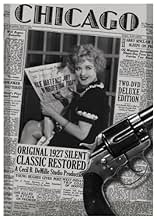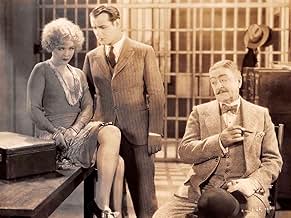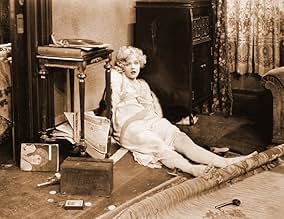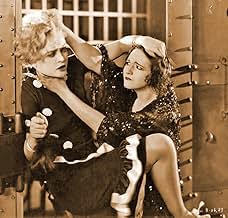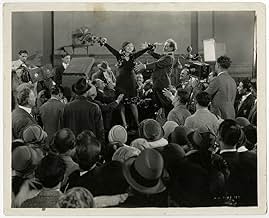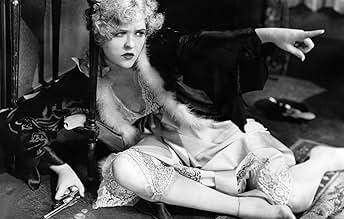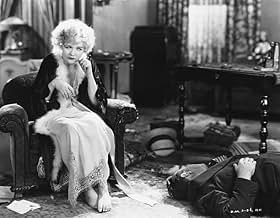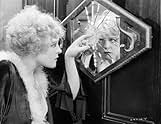Aggiungi una trama nella tua linguaA wild jazz-loving and boozing wife Roxie Hart kills her boyfriend in cold blood after he leaves her.A wild jazz-loving and boozing wife Roxie Hart kills her boyfriend in cold blood after he leaves her.A wild jazz-loving and boozing wife Roxie Hart kills her boyfriend in cold blood after he leaves her.
- Regia
- Sceneggiatura
- Star
- Premi
- 2 vittorie totali
Emily Barrye
- Woman in Cell Reading Book
- (non citato nei titoli originali)
Sidney Bracey
- Bill Collector
- (non citato nei titoli originali)
Robert Brower
- Juror
- (non citato nei titoli originali)
Sidney D'Albrook
- Photographer
- (non citato nei titoli originali)
Jack Dean
- Assistant Prosecutor
- (non citato nei titoli originali)
Robert Dudley
- Insurance Agent
- (non citato nei titoli originali)
Jim Farley
- Detective
- (non citato nei titoli originali)
Recensioni in evidenza
I read the Maureen Watkins play after seeing "Chicago" (2002) and "Roxie Hart" (1941). I was definitely looking forward to seeing this long lost 1927 version. While, I did enjoy many things, there were also some disappointments.
The good things are the little comic bits that are added which the play and other two movies do not have. These include Roxie putting black stockings on her door to pretend that someone inside has died to trick a repo-man and putting her husband's tie around her neck to show what the hangman's noose will look like. The rehearsal of her "looks" before the jury is hilarious, so are the three gum chewing young women spellbound by the trial as if watching a movie. These little bits really brighten the movie.
Unfortunately, probably because conservative, religious nut Cecil B. DeMille was the producer, the sharp satire of the play and the two other movies is sharply curtailed. What we get instead is a quite melodramatic subplot which takes up almost one quarter of the film. It involves the husband and his stealing money from the lawyer Flynn and his relationship with a housekeeper. This subplot is dull and undercuts the sense of sexiness and gallows humor that the play and the other movies thrive on.
While a good film and certainly worth seeing, it doesn't match the greatness of the later films or earlier play. The DVD does have some nice extras, including a well done documentary short looking at the real trial, Maureen Watkins original newspaper articles, a 1950 documentary on the 1920's and "The Flapper Story" a delightful 1985 documentary.
The good things are the little comic bits that are added which the play and other two movies do not have. These include Roxie putting black stockings on her door to pretend that someone inside has died to trick a repo-man and putting her husband's tie around her neck to show what the hangman's noose will look like. The rehearsal of her "looks" before the jury is hilarious, so are the three gum chewing young women spellbound by the trial as if watching a movie. These little bits really brighten the movie.
Unfortunately, probably because conservative, religious nut Cecil B. DeMille was the producer, the sharp satire of the play and the two other movies is sharply curtailed. What we get instead is a quite melodramatic subplot which takes up almost one quarter of the film. It involves the husband and his stealing money from the lawyer Flynn and his relationship with a housekeeper. This subplot is dull and undercuts the sense of sexiness and gallows humor that the play and the other movies thrive on.
While a good film and certainly worth seeing, it doesn't match the greatness of the later films or earlier play. The DVD does have some nice extras, including a well done documentary short looking at the real trial, Maureen Watkins original newspaper articles, a 1950 documentary on the 1920's and "The Flapper Story" a delightful 1985 documentary.
Chicago in the mid 20's of the last century.
In this modern Amerikan city reside the Hart's, a young married couple, who adapt to the spirit of the big city. Herr Amos Hart works in a tobacco store and Frau Roxie Hart does absolute nothing but to be unfaithful to her husband with an old man. The old-timer accommodates her whims although this is coming nearly to an end. So when Frau Roxie hears this news; she, who is a bad, bad girl ( besides a peroxide blonde with no brains ... excuse this Herr Graf for such obvious remark ) kills her lover in her apartment.
Desperate over what she has done, she calls for help to her husband telling him that the old man tried to get advantage of her. Herr Hart who is a good man but not stupid at all, discovers what really happened in there. But his love for Roxie is so important to him that he decides to help her by taking the services of a famous, greedy and unscrupulous advocate ( excuse again this Herr Graf for such an obvious remark ); this in order to defend his wife from the death penalty. However, such favour has an expensive price – 5.000 grand that obviously Herr Hart doesn't have.
During a visit to his greedy advocate, he finds out where he hides a lot of money in his bureau and during the night steals the money ( an honourable deed indeed, to rob an advocate ). Meanwhile Frau Roxie Hart's famous trial is nearly begun.
"Chicago", a film directed by Herr Frank Urson in the silent year of 1927, was based in a Broadway play which in turn was based on a true story ( occurring in a real city! ). Reminiscences of the original stage play in its primal concept can be seen in the film, when the director uses a few sets ( the Hart's apartment, the jail or the trial court ) in order to develop the story as it were different acts of a play. This is especially during the first part of the film during the dramatic development at the Hart's apartment and at the end of the movie during the trial. However, Herr Urson makes fairly good use of the proper characteristics of the cinema film narrative in "Chicago" by, constructing excellent visual metaphors ( the jury's feet responding Frau Roxie charms, the tabloid paper going down the gutter ). There are also important and sibylline sexual remarks that are present during the whole film (ah, that garter bell belt). And let's not forget the social realism that can be seen in the film ( Chicago daily life or the Hart's apartment ). Especially outstanding is the power of the yellow press in those old days ( and unfortunately in these modern days too ); the sensationalist journals build up stories on innocent celebrities that certainly have few merits. Naturally this happened with the madcap Roxie, a situation depicted in "Chicago" in a raw and effective way.
Another merit of "Chicago" is the combination of comedy and drama in equal terms highlighting Frau Roxie's stupidity, selfishness and easy living in contrast with her self-sacrificing husband who suffers the acts and nonsense of his wife. He's a man who honestly cares about and loves his wife enough to steal and lie for her although this affection and emotion is not returned.
Starring as the couple are two excellent and not well-known actors who handle their roles considerably well. Herr Victor Varconi as Herr Amos Hart is the lovingly and humiliated husband. Frau Phyllis Haver shines and takes all the credit in the picture thanks to her brilliant performance as Roxie Hart, a madcap, simple and selfish modern girl who has no scruples combined with no brains ... who will have a moment of glory as a famous killer thanks to the help of the yellow press ... who will meet her end on the end of a rope a woman who lives her own life caring for no one except the money.
"Chicago" is an excellent silent movie for all those reasons mentioned above by this German count. Don't forget also a modern one added recently featuring a superb musical score compiled by Herr Rodney Sauer and "The Mont Alto Motion Picture Orchestra". They capture the spirit and mood of the roaring twenties of the last century.
And now, if you'll allow me, I must temporarily take my leave because this German Count must to return to the Schloss from the Windy City.
Herr Graf Ferdinand Von Galitzien http://ferdinandvongalitzien.blogspot.com
In this modern Amerikan city reside the Hart's, a young married couple, who adapt to the spirit of the big city. Herr Amos Hart works in a tobacco store and Frau Roxie Hart does absolute nothing but to be unfaithful to her husband with an old man. The old-timer accommodates her whims although this is coming nearly to an end. So when Frau Roxie hears this news; she, who is a bad, bad girl ( besides a peroxide blonde with no brains ... excuse this Herr Graf for such obvious remark ) kills her lover in her apartment.
Desperate over what she has done, she calls for help to her husband telling him that the old man tried to get advantage of her. Herr Hart who is a good man but not stupid at all, discovers what really happened in there. But his love for Roxie is so important to him that he decides to help her by taking the services of a famous, greedy and unscrupulous advocate ( excuse again this Herr Graf for such an obvious remark ); this in order to defend his wife from the death penalty. However, such favour has an expensive price – 5.000 grand that obviously Herr Hart doesn't have.
During a visit to his greedy advocate, he finds out where he hides a lot of money in his bureau and during the night steals the money ( an honourable deed indeed, to rob an advocate ). Meanwhile Frau Roxie Hart's famous trial is nearly begun.
"Chicago", a film directed by Herr Frank Urson in the silent year of 1927, was based in a Broadway play which in turn was based on a true story ( occurring in a real city! ). Reminiscences of the original stage play in its primal concept can be seen in the film, when the director uses a few sets ( the Hart's apartment, the jail or the trial court ) in order to develop the story as it were different acts of a play. This is especially during the first part of the film during the dramatic development at the Hart's apartment and at the end of the movie during the trial. However, Herr Urson makes fairly good use of the proper characteristics of the cinema film narrative in "Chicago" by, constructing excellent visual metaphors ( the jury's feet responding Frau Roxie charms, the tabloid paper going down the gutter ). There are also important and sibylline sexual remarks that are present during the whole film (ah, that garter bell belt). And let's not forget the social realism that can be seen in the film ( Chicago daily life or the Hart's apartment ). Especially outstanding is the power of the yellow press in those old days ( and unfortunately in these modern days too ); the sensationalist journals build up stories on innocent celebrities that certainly have few merits. Naturally this happened with the madcap Roxie, a situation depicted in "Chicago" in a raw and effective way.
Another merit of "Chicago" is the combination of comedy and drama in equal terms highlighting Frau Roxie's stupidity, selfishness and easy living in contrast with her self-sacrificing husband who suffers the acts and nonsense of his wife. He's a man who honestly cares about and loves his wife enough to steal and lie for her although this affection and emotion is not returned.
Starring as the couple are two excellent and not well-known actors who handle their roles considerably well. Herr Victor Varconi as Herr Amos Hart is the lovingly and humiliated husband. Frau Phyllis Haver shines and takes all the credit in the picture thanks to her brilliant performance as Roxie Hart, a madcap, simple and selfish modern girl who has no scruples combined with no brains ... who will have a moment of glory as a famous killer thanks to the help of the yellow press ... who will meet her end on the end of a rope a woman who lives her own life caring for no one except the money.
"Chicago" is an excellent silent movie for all those reasons mentioned above by this German count. Don't forget also a modern one added recently featuring a superb musical score compiled by Herr Rodney Sauer and "The Mont Alto Motion Picture Orchestra". They capture the spirit and mood of the roaring twenties of the last century.
And now, if you'll allow me, I must temporarily take my leave because this German Count must to return to the Schloss from the Windy City.
Herr Graf Ferdinand Von Galitzien http://ferdinandvongalitzien.blogspot.com
I really liked this film, viewed from the UCLA print. Phyllis Haver, now all but forgotten, shines as Roxie Hart, a good time girl who despises her husband and seeks sugar daddies for fun. As soon as you see her pretending to sleep, having discarded her garter with bells attached, you know she's trouble.
So Roxie kills, and goes to jail, and because she's blonde and pretty, she's taken up by the media in this wild world of flappers and jazz. Those familiar with the musical film with Renee Zellweger and Catherine Zeta-Jones will be wondering 'where's Velma?' but that character isn't in the forefront at all. This film is all about Roxie, and, more than the musical version, to some extent about her cuckolded husband Amos. Here we see his point of view on several occasions, and even follow him in scenes where Roxie doesn't appear. Victor Varconi puts in a lovely performance as Amos in this film.
Haver might dominate the proceedings, and lights up what is already a fast-moving and effective bit of jazz fluff, but there's a good, if brief performance from Eugene Palette as well. As Casely he is very watchable indeed.
As this was a late silent, the acting styles are mainly naturalistic, and the fact that it does not have sound, only titles, doesn't matter a bit when it comes to following the story. Miss Haver acts her heart out anyway and you can feel her contempt, her fear, her desperation, just as you would if you could hear it.
A superior film, and one which occasionally makes it out for public showings. A great pity it isn't on DVD as it is extremely enjoyable and deserves a wider potential audience.
So Roxie kills, and goes to jail, and because she's blonde and pretty, she's taken up by the media in this wild world of flappers and jazz. Those familiar with the musical film with Renee Zellweger and Catherine Zeta-Jones will be wondering 'where's Velma?' but that character isn't in the forefront at all. This film is all about Roxie, and, more than the musical version, to some extent about her cuckolded husband Amos. Here we see his point of view on several occasions, and even follow him in scenes where Roxie doesn't appear. Victor Varconi puts in a lovely performance as Amos in this film.
Haver might dominate the proceedings, and lights up what is already a fast-moving and effective bit of jazz fluff, but there's a good, if brief performance from Eugene Palette as well. As Casely he is very watchable indeed.
As this was a late silent, the acting styles are mainly naturalistic, and the fact that it does not have sound, only titles, doesn't matter a bit when it comes to following the story. Miss Haver acts her heart out anyway and you can feel her contempt, her fear, her desperation, just as you would if you could hear it.
A superior film, and one which occasionally makes it out for public showings. A great pity it isn't on DVD as it is extremely enjoyable and deserves a wider potential audience.
Phyllis Haver stars here as Roxie Hart in a story based on a hit Broadway play from 1927. Just about everyone is familiar with the story. Roxie plugs her lover and tries to pin it on her sap of a husband Amos. But while in jail she becomes a tabloid queen, especially after lawyer Billy Flynn enters the picture. He's an expert on law and headlines, especially after he gets his $5,000.
Haver, who looks a lot like Laura La Plante here) is terrific as the hard-boiled Roxie as she learns the ropes in prison and in the court room. Haver never misses a comic or ironic beat. Victor Varconi plays the hapless Amos, but he has a whole subplot here that's not in the famous musical versions of this play. Billy is played by Robert Edeson, the matron is played by May Robson, and Casley is played by Eugene Palette. There is no Velma Kelly in this story but Roxie's rival in prison, who is unnamed, is played by Julia Faye.
The film was produced by Cecil B. DeMille and although Frank Urson gets credit for direction, many think the film was directed by DeMille.
This new DVD release by Flicker Alley is a gorgeous print with solid music by the Mont Alto Orchestra. The sound effects are amusing.
Haver, who looks a lot like Laura La Plante here) is terrific as the hard-boiled Roxie as she learns the ropes in prison and in the court room. Haver never misses a comic or ironic beat. Victor Varconi plays the hapless Amos, but he has a whole subplot here that's not in the famous musical versions of this play. Billy is played by Robert Edeson, the matron is played by May Robson, and Casley is played by Eugene Palette. There is no Velma Kelly in this story but Roxie's rival in prison, who is unnamed, is played by Julia Faye.
The film was produced by Cecil B. DeMille and although Frank Urson gets credit for direction, many think the film was directed by DeMille.
This new DVD release by Flicker Alley is a gorgeous print with solid music by the Mont Alto Orchestra. The sound effects are amusing.
"Those who forget History are condemned to repeat it" is the famous quote and perhaps that explains the current movie climate where remakes predominate. As we continue to evolve into a culture of short term gratification and long term memory loss, it's important to rediscover forgotten parts of our cinematic history especially when it's presented in such a way as this. David Shepard and Flicker Alley are to be congratulated yet again for their fine work in bringing to us another film previously thought to be lost.
For those of you not familiar with the award winning Broadway musical or 2002 film version, CHICAGO is based on a 1926 play which tells the story of the trial of Roxie Hart, an adulterous wife who shot her lover after he tried to ditch her. The play isn't about the verdict but how the trial is used to promote almost everyone involved except the long suffering husband. Although played for all its melodramatic possibilities with elements of humor, it sadly shows us that little has changed in 80 years when it comes to sensational journalism.
The film rights were quickly snapped up by Cecil B. De Mille who had his own movie company at this time. It's essentially his movie all the way but he allowed Frank Urson (an assistant director) to take credit because of De Mille's involvement with THE KING OF KINGS which was already in theaters. Phyllis Haver gives a wonderfully manic and comic performance as Roxie Hart while Victor Varconi excels as the betrayed husband, Amos Hart and yes that's gravelly voiced Eugene Pallette minus his voice and later girth as the murdered lover. The print looks as if it were processed yesterday and Rodney Sauer's score is up to his usual fine standards. With the usual Flicker Alley extras, CHICAGO is a must for silent film fans and is an ideal introduction to those who are not...For more reviews visit The Capsule Critic.
For those of you not familiar with the award winning Broadway musical or 2002 film version, CHICAGO is based on a 1926 play which tells the story of the trial of Roxie Hart, an adulterous wife who shot her lover after he tried to ditch her. The play isn't about the verdict but how the trial is used to promote almost everyone involved except the long suffering husband. Although played for all its melodramatic possibilities with elements of humor, it sadly shows us that little has changed in 80 years when it comes to sensational journalism.
The film rights were quickly snapped up by Cecil B. De Mille who had his own movie company at this time. It's essentially his movie all the way but he allowed Frank Urson (an assistant director) to take credit because of De Mille's involvement with THE KING OF KINGS which was already in theaters. Phyllis Haver gives a wonderfully manic and comic performance as Roxie Hart while Victor Varconi excels as the betrayed husband, Amos Hart and yes that's gravelly voiced Eugene Pallette minus his voice and later girth as the murdered lover. The print looks as if it were processed yesterday and Rodney Sauer's score is up to his usual fine standards. With the usual Flicker Alley extras, CHICAGO is a must for silent film fans and is an ideal introduction to those who are not...For more reviews visit The Capsule Critic.
Lo sapevi?
- QuizAlthough Frank Urson is credited as the director, it was widely known (and even publicized) at the time that producer Cecil B. DeMille directed most of the film (including 11 days of re-takes). DeMille took his name off the picture because his Biblical epic, Il re dei re (1927) was also playing in theaters at the time. Reportedly, DeMille's friend, theater owner Sid Grauman, convinced the director that audiences wouldn't want to see an amoral crime drama with an adulterous heroine so soon after seeing DeMille's film about the life of Christ.
- Citazioni
William Flynn: Cut the bull! I'm not your husband - I'm your lawyer!
- ConnessioniFeatured in The 79th Annual Academy Awards (2007)
I più visti
Accedi per valutare e creare un elenco di titoli salvati per ottenere consigli personalizzati
- How long is Chicago?Powered by Alexa
Dettagli
Botteghino
- Budget
- 264.397 USD (previsto)
- Tempo di esecuzione1 ora 45 minuti
- Mix di suoni
- Proporzioni
- 1.33 : 1
Contribuisci a questa pagina
Suggerisci una modifica o aggiungi i contenuti mancanti


